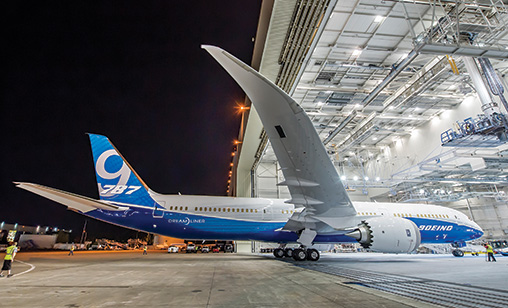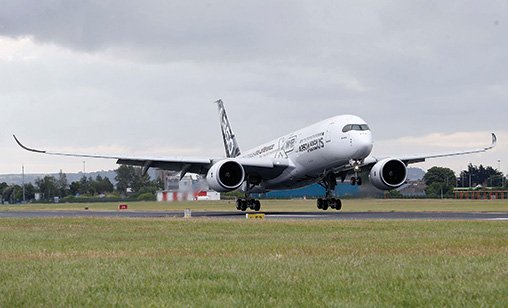Main Story
Testing times for aerospace big guns
It’s has been tough couple of months for Airbus and Boeing as funds from government backed agencies dry up, stalling some deals, and the European Union investigates alleged price setting at several aviation manufacturers and suppliers.
May 1st 2016
The belief that the small number of global aircraft and engine manufacturers concentrates power in the hands of the few when setting aftermarket services rates is to be tested by the European Union (EU). Read More »
In March, the EU initiative was given added authority when the International Air Transport Association (IATA) said it was an official complainant in the investigation because “airlines wanted the situation clarified”.
 |
| Boeing chairman, president and CEO, Dennis Muilenburg: ordered airline group restructuring to keep aircraft costs competitive |
The IATA endorsement was news aerospace companies did not need. In the last 12 months, U.S. manufacturers have been stymied by a hiatus in the operations of the U.S. Export-Import Bank (EXIM), a valuable source of funding for some of Boeing’s customers.
The Boeing Group’s board chairman, president and CEO, Dennis Muilenburg, told a U.S. conference recently that the company was on the verge of losing orders because only two of the five seats on EXIM’s board had been filled, which meant deals of more than $10 million could not be approved.
More recently, Airbus was presented with its own customer financing issue. Britain’s version of EXIM, the UK Export Finance Bank, halted support for the European plane maker until it provided “satisfactory” assurances about its dealings with “overseas agents”. A week later, Germany and France withdrew export credit guarantees from Airbus.
This latest set of challenges comes at a time when Airbus and Boeing are engaged in sales battles that are as fierce as they have ever been.
With price the only game in town for winning orders, Boeing’s Muilenburg has announced the most significant restructuring at the group in years with the ultimate aim of defeating Airbus on value and price in the negotiating room.
By June, the company intends to eliminate 4,500 jobs from its 161,000-strong workforce, a headcount reduction that will trim the workforce by 5% company-wide.
The jobs are going despite the manufacturer’s $431 billion production backlog of 5,800 aircraft at the end of 2015.
In a note to employees, Boeing Commercial Airplanes chief executive, Ray Conner, said the focus on costs was coming “at a time when price carries more weight than ever in sales campaigns. This should concern us all because if our costs are high, it gives us less pricing flexibility”. “Customers will be forced by their own competitive pressures to take their business elsewhere,” he said.
The EU investigation, being conducted by the European Commission’s Directorate General for Competition (DG-COMP), will examine the rates Original Equipment Manufacturers (OEMS) charge for their aftermarket services, parts and third party MRO client access to propriety information.
In 2015, the DG-COMP sent questionnaires to several industry stakeholders, including IATA member airlines. It requested information to validate claims of abuses of dominant positions by aviation OEMs when writing MRO and parts contracts.
“This is an area of deep concern for our members,” said IATA director general and CEO, Tony Tyler. “There are relatively few equipment vendors and our members are frustrated that there is little flexibility in negotiations for aftermarket services.
 |
| 'Boeing’s -787 made its first dollar over its investment at year ten. If the fully allocated cost of airplane #1 in a model line was charged, the cost would be immense. To make the initial deal more commercially viable, manufacturers price their products on the expected total value of the initial charge plus the expected earnings stream from the aftermarket sales' |
“Airlines do not have the leverage to resolve these concerns individually. So IATA is fulfilling its role as their global trade association and representing their interests as a complainant.”
IATA will not claim monetary damages or other forms of compensation for past conduct. “Our focus is on the future. Our members want to be able to negotiate contract terms more effectively and with more options than the OEM community will entertain today,” said Tyler.
“OEM revenues are airline costs, so there is a natural tension on this issue. But airlines are, and will continue to be, important customers for OEMs. Whatever conclusion the investigation comes to, at the end of the process there will be greater clarity on the rules of the game and how they should be applied. That will be a good development for all involved.”
The OEMs are not saying much about the EU investigation, which is expected to take months to complete.
Joseph M. Del Balzo, a former U.S. Federal Aviation Administration (FAA) acting administrator and now president of consultancy, JDA Aviation Technology Solutions, said if the process continues it is likely the U.S. Department of Justice would join in the matter.
The former FAA administrator warned an anti-trust case could have serious consequences for the structure of aerospace manufacturing and could have safety implications.
“Judgments made about the costing of these complex engineered products could impact on the ability of the OEMs to accumulate the capital needed to develop them. The economics and finances of both airframe and power plant manufacturing are well known.
“For example, the massive capital Pratt & Whitney has invested in research in the last 20 years as well as the $10 billion required to engineer the geared turbine engine requires years to recoup,” he wrote in the JDA Journal.
“Boeing’s -787 made its first dollar over its investment at year ten. If the fully allocated cost of airplane #1 in a model line was charged, it would be immense. To make the initial deal more commercially viable, manufacturers price their products on the expected total value of the charge plus the forecast earnings stream from the aftermarket sales.”
Del Balzo said the DG-COMP must determine if the sale of replacement parts are priced above their costs. “Erudite cost accountants and micro economists will have to study this ‘bundled’ price (original plus spares) to determine if it exceeds the appropriate costs,” he said.
“They would have to decide if the OEMs have used the limited availability of certificated parts as well as the restrictions on repair manuals and data to raise their charges above some lawful number.”
 |
When an OEM sells a large capital asset such as an aircraft or engine, certain manuals and data are part of the transaction. “It has been alleged the information so transmitted may not be adequate for the plane/engine owner to develop repairs and parts internally,” Del Balzo said.
“The counter argument is that full disclosure would allow competitors to replicate OEM products. If the OEMs cannot protect their intellectual capital, their incentive to research will be diminished. If the consequence of the DG-COMP and/or U.S. Department of Justice actions is to prohibit this practice, the result may be a diminution of safety.”
The U.S.’s EXIM suspended operations last June when its charter lapsed. It was renewed later in 2015. With only two seats filled and confirmation of a third board member halted by the U.S. Senate Banking Committee Chairman, Richard Shelby, some airplane sales have been blocked. Senator Shelby has imposed a moratorium on several of the 16 Obama administration financial nominees that require panel confirmation. It included EXIM.
Clearly, it is hurting Boeing. In April, EXIM Chairman, Fred Hochberg, said the appointment of a third board member would allow the agency to help finance billions of dollars in sales of U.S. aircraft, rail, power and communications equipment worldwide.
“We have about $10 billion worth of loans and guarantees in our pipeline that are being held up because of the short-handed board. If exports slow in the areas that require our financing, it will hit the supply chain of 14,000 U.S. companies that service Boeing and, as a result, threaten jobs,” he said.
For Airbus, the export-import issue stems from a different source. The financing halt by the UK, France and Germany is a result of scrutiny of the role of cross-border intermediaries in multinational deals.
This follows the search, in March, by authorities of a Monaco-based company, Unaoil SAM. It served as a go-between for companies and officials in the Middle East, Africa and former Soviet countries, and was accused of corruption.
There is absolutely no suggestion Airbus has been involved in corruption, but U.K. Export Finance said it was suspending support for Airbus after the manufacturer informed regulatory authorities of “inaccuracies” in a number of applications (for financing).
The suspension will remain in place until the company provides “satisfactory” assurances about its dealings with “overseas agents”. Airbus spokesman, Rainer Ohler, said German, French and U.K. export agencies typically act in concert.
Germany’s Federal Ministry for Economic Affairs and Energy said it was undertaking its own investigation with the cooperation of Airbus. Applications for new export credit guarantees in Germany were suspended pending completion of the evaluation.
If existing loans are affected, it could endanger shipments of Airbus planes sold on the basis that the financing package included the backing of government guarantees. However, less than 10% of Airbus plane sales use such guarantees.
Jefferies Equity Research tempered the impact of the financing hiatus with its estimate that export-credit agencies last year only provided 7% of financing for Airbus plane deliveries compared with 45% from leasing companies and 40% from airlines.
Airbus is co-operating fully with the relevant export credit agencies to re-establish the financing facility. “The group believes that although some export credit financing will be temporarily unavailable, the affected customers will be able to resume obtaining such financing or refinancing in the near future,” it said in a statement.
Boeing won the sales battle with Airbus in the first quarter of this year, although there were worrying signs of a slowdown in orders. Airbus sold a gross total of 32 aircraft and delivered 125 in the first quarter, down 74% and 7%, respectively, compared with the same period last year.
After adjusting for cancellations, it posted 10 net orders, the lowest figure for the first quarter of its year since 2011. Boeing reported 140 gross orders in the same period this year, or 122 after cancellations.
It should be pointed out a slowdown in deliveries of engines from Pratt & Whitney, while the engine manufacturer fixes software issues, has left a backlog of partially assembled jets at Airbus. Despite plans to raise its output of new planes in the first quarter, the European manufacturer’s production rate was 103 aircraft, the lowest first quarter total since 2011. Airbus expects to catch up later this year.